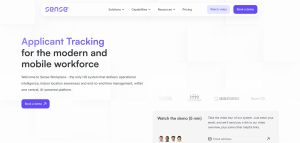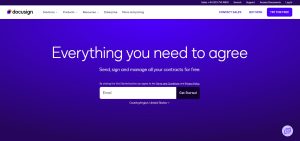
Top Business Tools for Large Enterprises in 2025
In 2025, large enterprises are expected to operate faster, smarter, and more flexibly than ever before. Managing thousands of tasks across departments, employees, regions, and systems means relying on tools that can scale, integrate, and streamline operations without friction.
Whether it’s HR, communication, analytics, customer engagement, or workflow management, the right business tools are essential for staying competitive.
Here are eight powerful platforms that large enterprises are using to simplify complexity, improve decision-making, and keep their teams aligned.
Powerful Business Tools for Large Companies: Top 8 Picks
1. SenseHR

SenseHR is one of the most flexible and scalable HR tools available today. Designed to serve large and growing teams, especially in the UK, it centralizes everything from onboarding and time tracking to performance reviews and contract storage.
Its intuitive interface and customizable workflows make it a favorite for HR teams handling high volumes of employee data and compliance tasks.
One standout feature is its support for leave management with HR system help, allowing employees to easily request time off while giving HR clear visibility over absences, coverage, and policy enforcement.
It eliminates manual spreadsheets and email chains by automating leave approvals, notifications, and balance calculations. SenseHR is also highly secure and compliant with local regulations, making it a smart long-term investment for companies that want both flexibility and control.
2. Microsoft Power BI
Microsoft Power BI helps large enterprises make sense of massive amounts of data. From sales and operations to HR and customer service, teams can use Power BI dashboards to track performance in real time, identify trends, and make faster, evidence-based decisions.
Its integration with Microsoft 365, Excel, Azure, and other major platforms makes it a strong contender for companies that already rely on Microsoft tools. With built-in AI features and customizable visuals, Power BI turns raw data into insight-rich reports that drive performance.
3. Salesforce
Salesforce remains a cornerstone CRM for global enterprises looking to personalize customer engagement at scale. It brings together customer data, marketing automation, sales forecasting, and support management, all in one cloud-based platform.
Whether you’re managing thousands of leads or servicing millions of customers, Salesforce helps unify your approach. Its wide app ecosystem and AI assistant, Einstein, also help teams prioritize tasks, predict outcomes, and automate repetitive processes.
4. Asana

Asana is more than a task manager, it’s a complete platform for coordinating projects across departments. With features like timelines, workload tracking, approvals, and team goal alignment, Asana helps large organizations stay productive without losing visibility.
Its enterprise version includes security and admin controls, integrations with tools like Slack, Zoom, and Jira, and portfolio views to monitor multiple projects in one dashboard.
Whether you’re launching a product or running a global campaign, Asana helps keep everyone moving in sync.
5. ServiceNow
ServiceNow is a leading digital workflow platform used by large companies to automate and optimize everything from IT services to employee onboarding. It connects departments and eliminates bottlenecks by digitizing approvals, service requests, and help desk interactions.
Its scalability makes it suitable for organizations with thousands of users, and its modules for HR, customer support, and operations make it more than just an IT tool, it’s a system for driving efficiency across the entire enterprise.
6. Slack
Slack is a powerful messaging platform that goes beyond team chats. It enables enterprise-wide communication with structured channels, searchable archives, external collaborator support, and deep integrations with tools like Google Drive, Zoom, and Salesforce.
With Slack Connect, businesses can securely collaborate with partners, vendors, and clients in shared spaces. Large organizations use Slack to break down communication silos, reduce internal emails, and speed up response times across departments.
7. Zoom
Zoom continues to be a staple for large enterprises needing high-quality, reliable virtual communication. From team meetings to global webinars, it offers scalability, security, and ease of use that fits the needs of dispersed workforces.
Features like breakout rooms, webinar hosting, integrations with calendars, and enterprise administration tools make it ideal for organizations that conduct regular meetings, trainings, or client presentations.
8. DocuSign

For large companies handling contracts, approvals, and formal agreements daily, DocuSign offers a seamless way to sign, send, and manage digital documents. It’s trusted across industries for its security, compliance, and global acceptance.
Beyond just e-signatures, DocuSign supports full agreement lifecycle management, tracking documents, setting expirations, sending reminders, and integrating with CRMs and document management systems.
Final Thoughts
As business operations become increasingly digital and interconnected, large enterprises need tools that scale with their complexity.
The right combination of platforms, from HR and analytics to project management and customer engagement, can help streamline workflows, improve productivity, and create more cohesive teams.
Whether you’re focused on better internal operations or external growth, the eight tools above offer the functionality and reliability enterprise teams need to thrive in 2025 and beyond.





